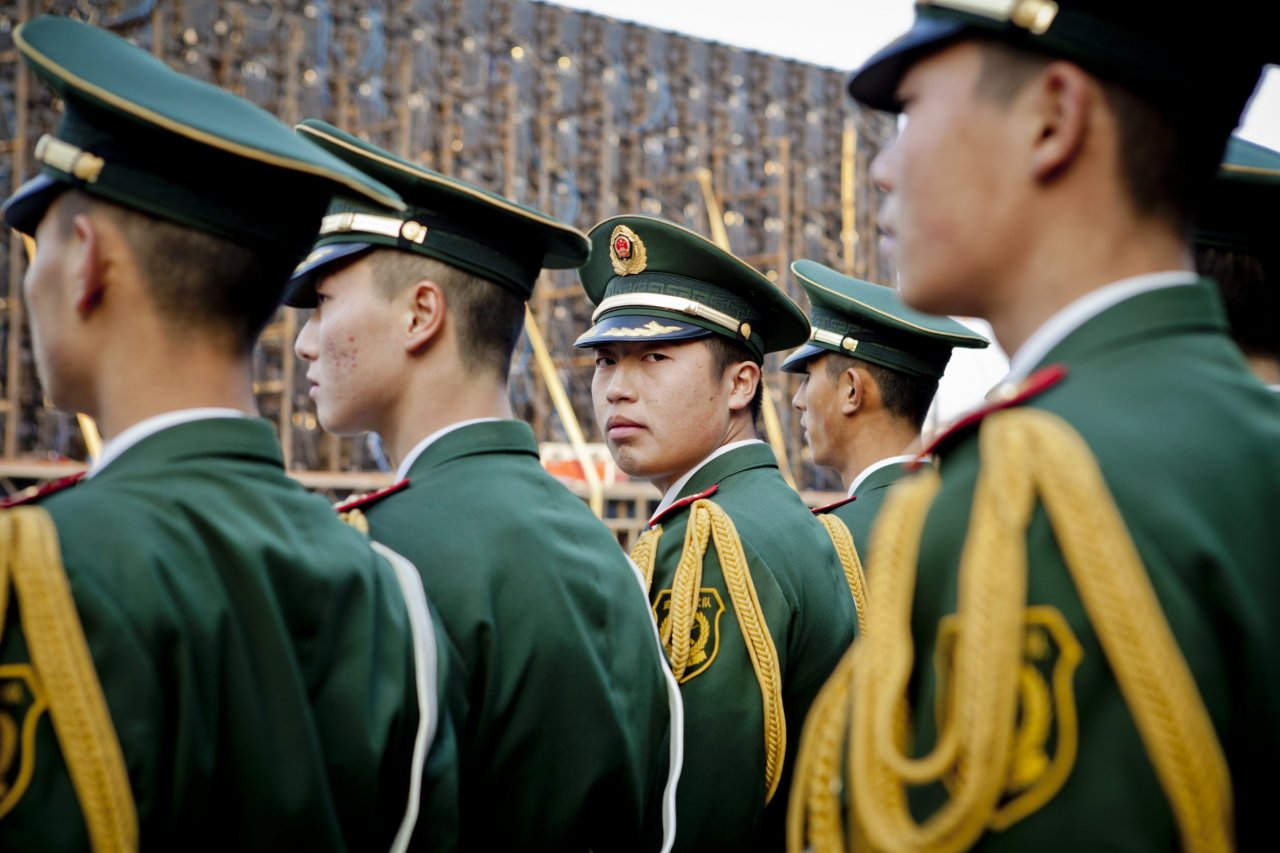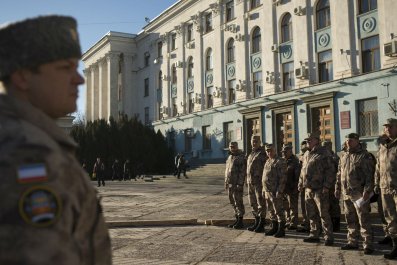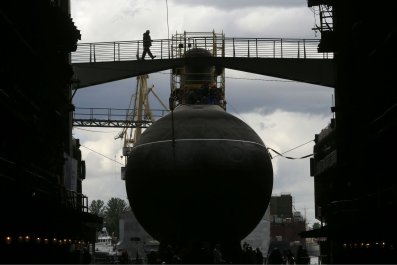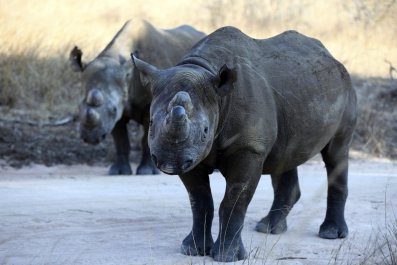For all the bloodcurdling horrors inflicted daily by the Islamic State (ISIS), and with all the high-stakes drama of the nuclear negotiations with Iran, it's easy these days to forget what may well be this generation's most important foreign policy challenge for the United States: dealing with the rise of an ever-more-powerful China.
For decades now—going back to China's historic opening under Deng Xiaoping—the prevailing notion in the United States has been that Washington and its allies must help China incorporate itself into the world's existing structures (its security arrangements, trading system, dispute-settlement organizations, multilateral institutions, etc.). As Beijing grew ever larger economically (and thus more powerful geopolitically), it needed, in other words, to find a home in a system drawn up and largely led by the United States in the wake of World War II.
For a brief time, after economically successful East Asian countries like South Korea and Taiwan made a successful transition from authoritarianism to democracy, a new conceit among the foreign policy establishment emerged: Given enough time and space, China, too, would shuck its authoritarian government (of the Communist variety) in favor of democracy. That proved a fantasy, a product of wishful thinking not intellectual rigor—and fewer and fewer foreign policy professionals believe it these days. What we're left with is the task of making China's rise as smooth as possible, something that surely the grown-ups running Beijing must want too, we all assure ourselves. (The most thoughtful recent rumination along this line came from Henry Kissinger, author of the historic opening to China under Richard Nixon, in his 2011 book, On China. Kissinger argued that Beijing and Washington could avoid outright conflict and reach a state of "combative coexistence.")
Now along comes Michael Pillsbury, whose intention is to shred the U.S. foreign policy establishment's conventional wisdom. He's the author of a new book, The Hundred-Year Marathon: China's Secret Strategy to Replace America as the Global Superpower. Pillsbury's been a China watcher his entire professional life, as a former Pentagon official who also served as a staffer on Capitol Hill. (He's now the director of the Center on Chinese Strategy at the Hudson Institute, a conservative think tank.) And as you can deduce from the title of his book, he has no patience for anyone who thinks China is simply going to slip into a U.S.-dominated world order and eventually coexist benignly as one of two superpowers.
To the contrary, he thinks that since the Communist Party came to power in 1949, its goal has been to be No. 1—the global superpower—and that it is executing a grand strategy to achieve that aim by 2049, exactly a century after the revolution. More to the point—and here it looks as if an excitable editor at Henry Holt trying to sell books got a central tenet of the book wrong in the title—Pillsbury argues that this is not by any means a secret strategy. He contends—and demonstrates pretty convincingly—that this goal has been hiding in plain sight for years.
Hiding in plain sight, that is, if you're a fluent reader and speaker of Mandarin, and, like Pillsbury, know where to look in the tightly controlled—but not entirely inaccessible—world of defense and military thinking in China. Indeed, Pillsbury writes of being invited to a People's Liberation Army (PLA) conference in Beijing in which China's long-term strategy is discussed openly. He writes that he was permitted to attend in part because his Chinese colleagues—hawks who don't hide their desire for China to ultimately supplant the U.S. as the global superpower—like the fact that he pays attention to what they say and write. Books are available in military bookshops accessible only to PLA members and their occasional invited guests—like Pillsbury. He scooped them all up and read them. He's also talked over the years to dozens of PLA strategists (several of whom are openly identified in the acknowledgements section at the end of the book, while others have to remain anonymous). His conclusion is bracing and, it should be said, widely rejected by a foreign policy–academic establishment that has not yet responded thoughtfully to his substantive arguments. "It's easy," Pillsbury writes, "to win a race when you're the only one who knows it has begun. China is thus on its way to supplanting the United States as the global hegemon, creating a different world as a result."
Central to Pillsbury's thesis is that the views of a group of strategists in the party and the military in Beijing—known as the ying pai, or hawks—are not out of the mainstream in Chinese thought (as commonly assumed in the West) but rather define the mainstream. This is, to be sure, a matter of debate—and one, given the opaque nature of the Chinese government, that is very difficult to assess. But give Pillsbury his due: He makes an argument—detailed and rigorous. The establishment needs to respond.
And, further, also give him this: Since Xi Jinping came to power in 2012, China's behavior in its backyard has changed. It has bullied what it regards as weaker neighbors, whether in disputes over small islands off the coast of Japan or the Philippines, or over oil exploration rights off the coast of Vietnam. Most recently, satellite images have shown Beijing building new islands in the South China Sea—islands that would presumably be used for new military installations.
Pillsbury would argue that such aggressive behavior has marked a predictable change in China's stance in accordance with the 100-year marathon strategy: It is making a transition. For the past 30 years, China's pose—and Pillsbury indeed believes it's been a charade, to emphasize weakness and gain access to Western technology and capital—has been "Woe is me, we're so poor, we have so many problems, please help us by giving us technology and investing in our poor backward country." That is now over. China is strong and getting stronger; Xi evinces a public self-confidence unseen in China's most recent bland leaders. And it's apparent he's not going to let little pissant countries like Vietnam or the Philippines—or even Beijing's historic enemy, Japan—distract it from claiming what China believes is hers.
In the inner councils of the party in Beijing, Pillsbury maintains, Chinese scholars and strategists focus on how they can get the United States to go down easily—to step aside with some grace, as Great Britain did after World War II—rather than having to fight a war against it.
In the concluding chapter, Pillsbury asks: What should the United States do about this? Some of his prescriptions land with a distinct thud. He says the United States should stop sending "experts" from various government agencies to help China—for example, no more bureaucrats from the Department of Labor who have, over the years, helped China "increase its productivity.'' (Someone needs to tell Pillsbury there are these things called Fortune 500 companies, every one of which has invested millions of dollars in China. They are the ones helping China make its economic leap—not planeloads of government bureaucrats. And what's Washington going to do? Tell General Electric and Microsoft and General Motors to stop investing in China? Lots of luck with that. )
Some of his prescriptions, though, make strategic sense. A popular board game in China is wei qi, in which the goal is to surround your opponent. It is, Pillsbury argues, central to China's strategic thinking. And there has at least been a nod in this direction in the Obama administration's so called "pivot" to Asia. By strengthening formidable alliances—Japan, South Korea—and forging new ones where possible (India, Vietnam, Myanmar), the U.S. can effectively surround China, at which point those who are not ying pai will see the futility of their strategy and chart a different, less hawkish course.
My view—I've been in China for the past nine years—is that the Obama administration's "pivot" is more rhetorical than real. As far as I can tell, the president still can't figure out whether China is a strategic competitor or a strategic rival, and in any event his main obsession when it comes to the bilateral relationship seems to be about the crisis formerly known as global warming, a.k.a. climate change. (Believe me, Pillsbury's ying pai are chortling about that one.)
The question—is China a rival determined to supplant Washington on the world stage, or is it willing to coexist?—is not, of course, an easy one to answer. Pillsbury writes, correctly, that Beijing is not monolithic. He believes the hawks are ascendant now but that need not remain the case. He's also right that for Washington, assessing the nature of China's ambition, and responding to it effectively, may be the central foreign policy challenge of our time. Pillsbury's thesis is provocative—and discomfiting. But that doesn't necessarily mean it's wrong.




























